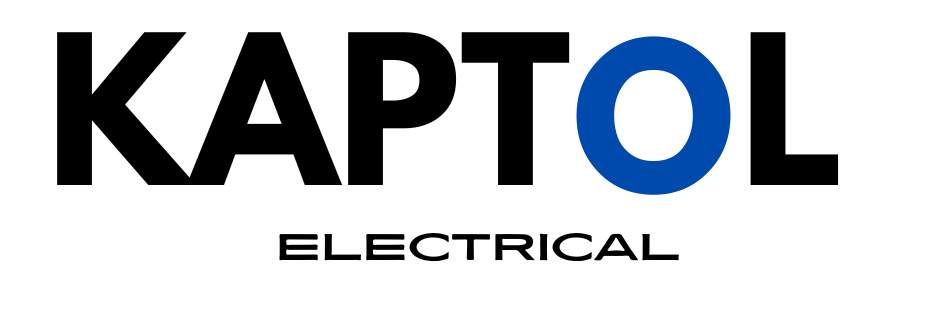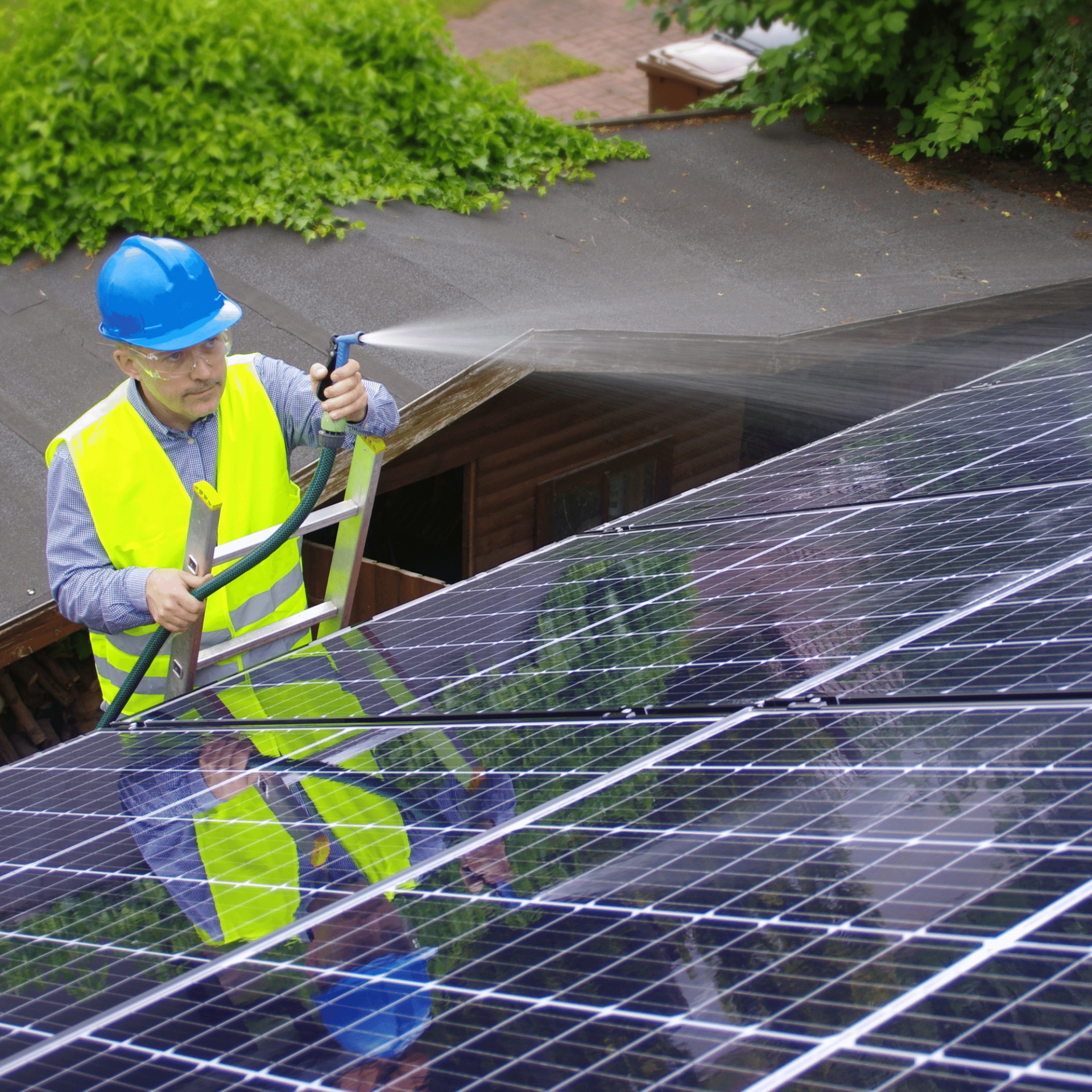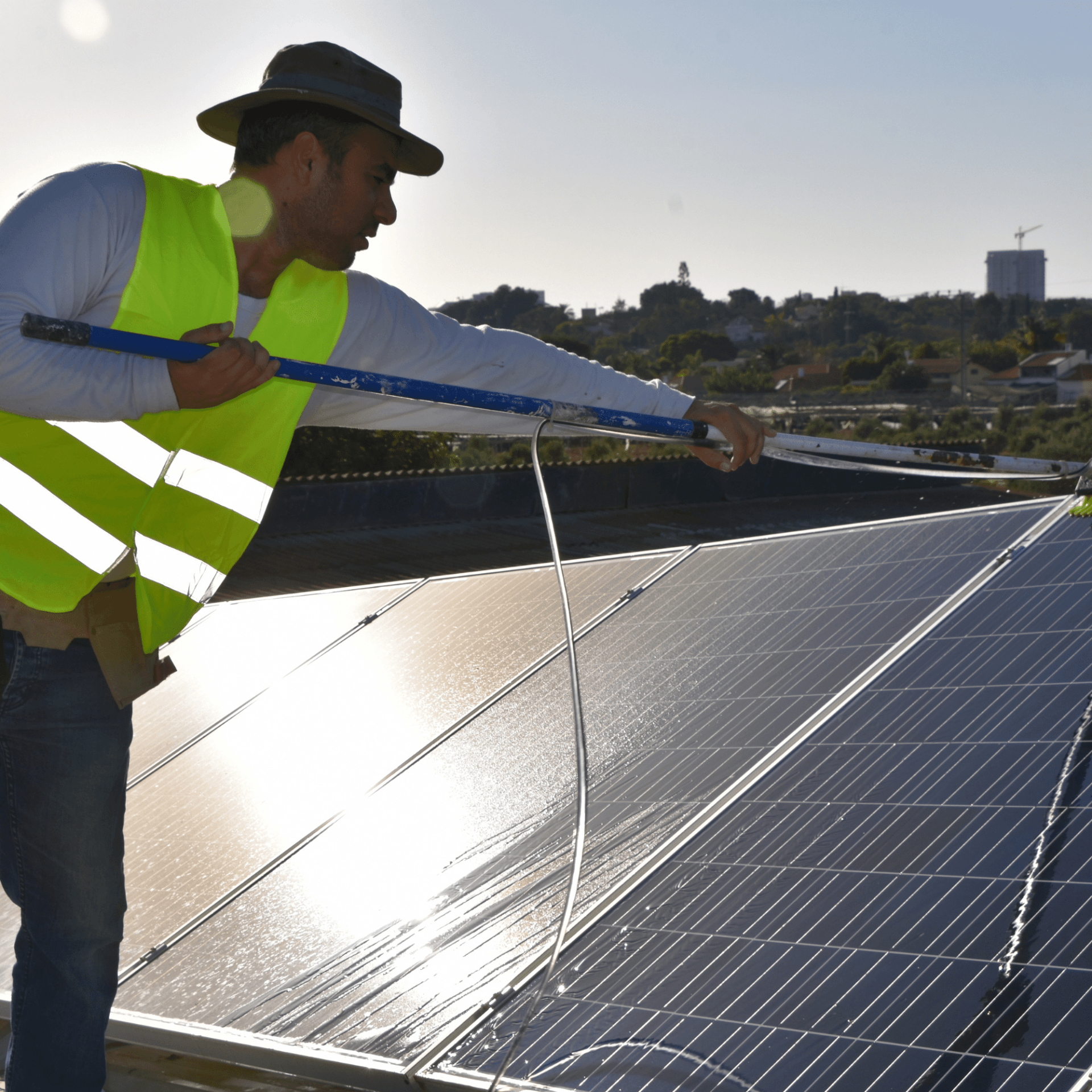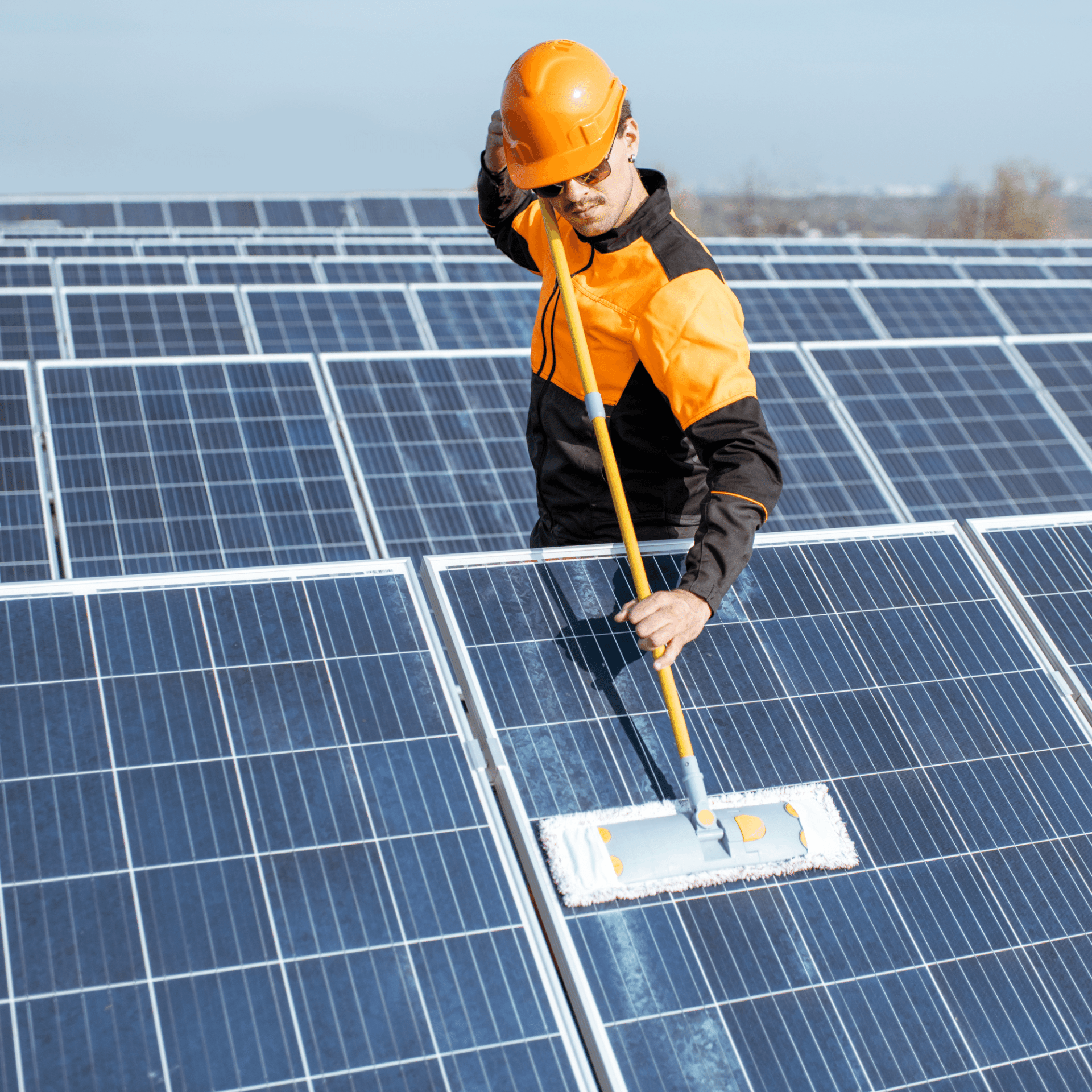Solar Panels
Why Solar Electricity?
We probably don't need to remind you of this, but Australians pay among the highest prices for electricity in the world.
Solar power can save you hundreds, or even thousands of dollars every year on your electricity bill.
For example, an average household can save between $534 and $1,150 per year. This depends your location and daily power consumption with a 3.0kW solar power system but is a good guide.
As the price of electricity goes up every year, so will the savings.
You can also apply for the Government Financial Incentive .
There has never been a better time to install a solar power system and begin enjoying the benefits of a reduced electricity bill.
It's often said the Australian sun is hot enough to fry an egg, so it makes sense to harness the power of our greatest natural source of energy for your home!
Get a FREE quote
Contact Us
Making the most of your solar system
Here are some helpful power tips to help you maximise the benefits of your solar system:
Small actions and changes in your everyday behaviour can reduce the consumption of your electricity significantly and reduce your payback period.
Making your home or business more energy efficient will make the most of your solar system.
Some of the ways you can do this include:
Using your appliances during the day, when your solar system is producing electricity.
To fully capitalise on your solar system's capabilities and maximise its benefits, integrating energy-efficient practices into your daily life is key. Beyond just using your appliances during the day, there are several nuanced and impactful strategies you can employ to enhance your home or business's energy efficiency. These measures not only reduce your electricity consumption and carbon footprint but also expedite the payback period on your solar investment.
Let's explore how to make your solar system work harder for you.
Integrating Solar Energy into Daily Activities
Shift to Solar-Peak Hours
- Understanding Solar Peak Production: Familiarise yourself with the times when your solar system's production is at its peak, typically around midday. Schedule energy-intensive household activities, such as laundry, cooking, and charging electric vehicles, during these hours.
- Use Timers and Smart Devices: Modern appliances often come with programmable features. Utilise these to run heavy appliances like dishwashers, washing machines, and pool pumps during daylight hours. Smart home devices can automate this process, ensuring optimal usage of solar energy without manual intervention.
Adopt Energy-Efficient Technologies
- Energy-Efficient Appliances: Replace older, inefficient appliances with newer models that have a higher energy star rating. This reduces overall energy demand, allowing you to maximize the direct use of solar power.
- LED Lighting: Transition to LED lighting for both indoor and outdoor use. LEDs consume a fraction of the energy of traditional bulbs and last significantly longer, offering considerable savings on both energy and replacement costs.
- Smart Thermostats: Installing a smart thermostat can significantly cut heating and cooling costs. These devices learn your schedule and temperature preferences, making energy-efficient adjustments automatically.
Home Energy Management
- Enhance Insulation: Improving your home’s insulation can drastically reduce the need for heating and cooling, thereby lowering energy consumption. This includes sealing leaks around doors and windows, adding insulation to attics and walls, and installing energy-efficient windows.
- Solar Water Heating: Consider installing a solar water heating system. This can be an effective way to use solar energy to provide hot water for your home or business, further reducing your reliance on grid electricity.
- Energy Storage Solutions: Investing in a solar battery storage system can capture excess energy produced during the day for use during the night or on cloudy days, ensuring your home uses solar energy as its primary power source.
Maintenance and Upgrades
- Regular Maintenance: Keeping solar panels clean and free from obstructions ensures they operate at maximum efficiency. Periodic professional inspections can identify and rectify issues such as shading from new growth on trees or dust accumulation.
- System Upgrades: Stay informed about technological advancements in solar energy. Upgrading components of your solar system, such as inverters or adding more efficient panels, can enhance its output and efficiency.
Behavioral Adjustments
- Mindful Energy Use: Encourage habits that reduce unnecessary energy consumption, like turning off lights when leaving a room or using natural ventilation instead of air conditioning when possible.
- Community Solar: If individual solar investment is out of reach, consider participating in a community solar project. This allows you to benefit from solar energy by subscribing to a portion of a larger solar farm.
Adapting these strategies not only maximises the utilization of your solar system but also fosters a sustainable lifestyle that contributes positively to the environment. By optimising your energy consumption patterns, investing in efficient technologies, and maintaining your solar system, you can significantly enhance its efficiency, reduce your carbon footprint, and enjoy financial savings over the long term. Making the most of your solar system is a journey of continuous improvement, combining technology, behaviour, and smart planning to achieve optimal results.
Turn appliances off, at the wall, to make sure they are completely off and not on “stand by”.
Turning appliances off at the wall to ensure they're not left on "stand-by" mode is a straightforward yet effective strategy to enhance the efficiency of your solar system and extend its benefits. This approach addresses the often-overlooked issue of "phantom load" or "vampire power," where electronic devices consume electricity even when they appear to be turned off. By eliminating this wasteful energy use, you can significantly reduce your household's electricity consumption, making your solar system even more beneficial.
Here's a couple of strategies and insights on maximising your solar system's potential by focusing on energy efficiency and smart usage.
Optimising Energy Use with Solar Power
Eliminate Phantom Loads
- Understanding Phantom Loads: Many modern electronics, including TVs, chargers, computers, and kitchen appliances, use electricity when they're off but still plugged in. This can add up to a significant portion of your energy bill.
- Use Smart Power Strips: Smart power strips can detect when a device is in standby mode and cut off power, preventing phantom loads. This is particularly useful for entertainment centres and office setups.
Leverage Solar Production Peaks
- Monitor Solar Output: Use a solar monitoring system to understand when your system is producing the most electricity. Aligning energy-intensive activities with these peak times maximises the use of solar energy and reduces grid dependency.
- Dynamic Shifting: For households with flexible schedules, consider shifting activities such as laundry, dishwashing, and baking to daytime hours when solar production is highest.
Energy Efficiency Enhancements
Energy-Efficient Appliances
- Upgrade to High-Efficiency Models: When it's time to replace old appliances, choose models with the best energy efficiency ratings. This not only reduces energy consumption but ensures that your solar power goes further.
- Regular Maintenance: Keeping appliances in top condition, such as cleaning filters and servicing older equipment, can significantly improve their efficiency.
Smart Home Automation
- Automated Systems: Install a home automation system that can control lighting, heating, cooling, and appliances based on usage patterns and peak solar production times. This can optimise energy use without sacrificing comfort.
- Programmable Thermostats: A smart thermostat can adjust heating and cooling settings based on when you're home, asleep, or away, further reducing unnecessary energy use.
Turn the thermostat down on your hot water heater.
This could be the major usage of power in your home if you have an electric booster hot water system.
Turning down the thermostat on your hot water heater, particularly if it incorporates an electric booster in a solar hot water system, is a strategic move to enhance the efficiency of your solar setup and minimise electricity consumption.
This approach targets one of the most significant sources of energy demand within many homes and businesses, offering a straightforward yet impactful way to reduce your energy bills and improve the return on investment for your solar system.
Here's another couple of strategies to further optimise your solar system's benefits.
Adjust Hot Water Usage
Optimal Thermostat Settings
- Find the Sweet Spot: The ideal temperature setting for your hot water system typically lies between 49°C (120°F) and 54°C (130°F). This range is hot enough for comfort and safety (minimising bacterial growth) but low enough to save energy.
- Consider Timers: For systems with an electric booster, using a timer to limit boosting periods to off-peak hours or times of low solar production can further reduce energy consumption.
Insulate Hot Water Pipes
- Reduce Heat Loss: Insulating your hot water pipes prevents heat loss as water travels from your heater to taps or appliances, allowing you to lower the thermostat setting without sacrificing water temperature at the point of use.
Integrate Smart Home Technologies
Smart Thermostats for Space Heating and Cooling
- Automated Efficiency: Smart thermostats can adjust your home’s heating and cooling systems based on actual usage patterns and preferred comfort levels, ensuring energy is not wasted.
Home Energy Management Systems (HEMS)
- Optimize Solar Consumption: A HEMS can provide detailed insights into your energy production and consumption, allowing you to make informed decisions on running major appliances and potentially shifting more energy usage to daylight hours.
Solar-Compatible Appliances
Upgrade to Solar-Ready Appliances
- Solar-Optimised: Some modern appliances are designed to work more efficiently with solar power systems, including variable-speed pool pumps and solar-compatible hot water systems.
- Demand Response Appliances: These appliances can respond to signals from your energy provider to run at times when electricity is cheaper or when your solar system is producing excess power.
Improve Overall Energy Efficiency
Energy Efficiency Audits
- Identify Savings Opportunities: A professional energy audit can uncover specific areas in your home or business where improvements can lead to substantial energy savings.
Sealing and Insulation
- Minimise Energy Waste: Properly sealing leaks and improving insulation in walls, roofs, and floors can significantly reduce the need for heating and cooling, lessening the burden on your solar system.
Utilise Energy Storage Solutions
Solar Battery Storage
- Store Excess Energy: By storing surplus solar energy produced during the day, you can use it during the evening or on cloudy days, reducing your reliance on the grid and maximising the use of your solar production.
Consider a Solar Water Heating System
- Direct Solar Heating: If your current setup relies heavily on an electric booster, transitioning to a solar thermal system for water heating can be more efficient and cost-effective in the long run.
Turn of air conditioners and heaters if you aren’t home, and only use them in rooms that are occupied.
Turning off air conditioners and heaters when you aren't home, or limiting their use to only occupied rooms, represents a highly effective approach to reducing energy consumption and enhancing the efficiency of your solar system. This strategy aligns with the broader principle of mindful energy use—leveraging technology smartly to match your actual needs without wasting resources.
Here's some additional measures that can complement this approach, further optimizing your solar energy benefits.
Smart Climate Control
Utilise Smart Thermostats
- Adaptive Scheduling: Smart thermostats can learn your schedule and preferences, adjusting the climate in your home just before you arrive and reducing energy use when you're away.
- Zone-Based Heating and Cooling: Some advanced systems allow for the control of temperature in individual rooms, ensuring that only occupied spaces are heated or cooled, thus saving significant amounts of energy.
Enhance Home Insulation
Reduce Thermal Exchange
- Insulation Upgrades: Improve insulation in walls, ceilings, and floors to minimise the loss of cool air in summer and warm air in winter. This reduces the need for constant heating and cooling.
- Seal Leaks: Identify and seal leaks around doors, windows, and any other areas where air can escape. Even minor improvements can lead to noticeable reductions in energy usage.
Implement Passive Cooling and Heating Techniques
Passive Design
- Natural Ventilation: Use windows, vents, and doors to create cross-ventilation, significantly reducing the need for air conditioning on cooler days.
- Thermal Mass: Incorporate materials that absorb heat during the day and release it at night, helping maintain a stable indoor temperature without active heating or cooling.
Use Energy-Efficient Windows and Coverings
Window Treatments
- Double-Glazing: Installing double-glazed windows can greatly reduce heat transfer, keeping your home warmer in winter and cooler in summer.
- Smart Coverings: Use blinds, curtains, and shades to control sunlight and heat entering your home. Reflective blinds or blackout curtains can significantly reduce the need for cooling during hot months.
Adopt a Lifestyle Aligned with Solar Production
Align Activities with Solar Output
- Maximise Daylight Use: Shift activities that require significant energy, like laundry or use of electric ovens, to daylight hours when your solar system's production is at its peak.
- Energy Storage: Consider investing in a solar battery system to store excess energy generated during the day for use at night, further reducing your reliance on grid electricity.
Regular Maintenance
Keep Systems Efficient
- HVAC Maintenance: Regular servicing of your heating, ventilation, and air conditioning (HVAC) systems ensures they are running efficiently, reducing unnecessary energy drain.
- Solar System Check-ups: Ensure your solar panels and related equipment are regularly checked and cleaned to maintain optimal performance.
Educate and Engage
Involve All Users
- Awareness and Training: Educate family members or employees about the importance of energy efficiency and the role they can play in optimizing the use of your solar system.
- Incentivise Conservation: For businesses, consider implementing incentives for departments or teams that successfully reduce their energy use.
By adopting these practices, you can significantly reduce your electricity consumption, thereby increasing the efficiency of your solar system. These strategies not only contribute to a quicker payback period for your solar investment but also promote a sustainable and environmentally responsible lifestyle. Each action, from smartly managing your heating and cooling systems to optimizing your home’s insulation and engaging in energy-conscious behaviors, leverages the full potential of your solar system, ensuring you make the most of this renewable energy source.
Use only energy efficient light bulbs.
Install shades or blinds on your windows to prevent heat gain in your home.
At Kaptol Electrical we will customise a solar panel system to maximise the efficiency of your new solar system.
Give one of our dedicated and professional team members a call today.
It will be the start of a brighter future.
We can also clean and maintain your existing solar panels!
How often should I clean my solar panels?
If you’ve had solar panels installed on your home this is probably a question you have asked yourself.
Regular cleaning and maintenance is an important part of anything, including your solar panels.
Maintenance of your system within the first year of installation is important. Clean panels are more efficient and will get you the most return on your investment.
Here's some useful information on how often you should get your solar panels cleaned, who should do the cleaning, and why they should be cleaned in the first place.
Why Do Solar Panels Need Cleaning?
Before we discuss how often your solar panels need to be cleaned, let’s look at why they need regular cleaning in the first place.
You may not realise that solar panels can get very dirty in a short time, which makes sense when you consider that they are exposed to the elements day in and day out.
When dirt and grime builds up on the surface of the panel, it reduces the performance of the photovoltaic system.
The panels work best when there are no obstructions between the UV rays and the glass panel.
The most common obstructions are:
- dirt
- dust
- grime
- bird droppings
When these build up on your solar panels, they become less efficient unless they are cleaned regularly.
How Often Should My Solar Panels Be Cleaned?
Solar panel specialists have different views on how often they need to be cleaned, however most will agree that you should have them cleaned every six months.
There are situations, like unusual weather conditions, where you may need to clean them more frequently.
A good 'rule of thumb' would be to have your solar panels cleaned at the end of the winter and summer seasons.
Should I Clean My Solar Panels myself?
No!
It’s always recommended you hire a professional solar cleaning business to wash your panels safely.
Handling soapy water on a high roof without any safety equipment is very dangerous, so never risk it!
Cleaning Solar Panels is a specialist task which needs to be done correctly or they can be damaged.
Or even worse, you risk injuring yourself during the cleaning process.
Always get your solar Panels cleaned by a professional!





